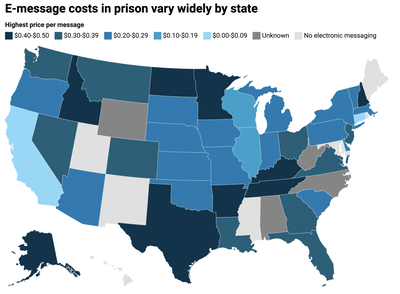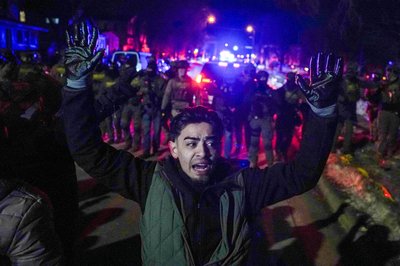Summary

- Advocate (noun) — a person who publicly supports or recommends a particular cause or policy
- Kickback (noun) — a payment made to someone who has facilitated a transaction, often used to suggest criminal transactions
- Fine (noun) — a sum of money charged as a punishment
- Telecommunications providers (noun) — businesses that provide services based in exchanging information and communication
Five Facts
- What communication services are still being exploited by prison telecom companies?
- Where are the costs of e-message services 50 cents or lower?
- Which government agency has the authority to regulate in-state prison phone calls?
- Why do jail phone calls tend to be more expensive than ones in state prisons?
- How do communication costs affect families with incarcerated loved ones?
Focus Questions
Focus question: PBS Newshour’s Roby Chavez reports that Securus alone supplies nearly half of the prisons systems that offer e-massing, holding contracts in 22 states. He also reports that county jails, unlike state prisons, can’t negotiate down rates. What does it mean when the incarceration system relies on businesses to supply basic public goods? News analysis : Roby Chavez reports on Charles Amos, a formerly incarcerated individual who helps his friends in prison communicate with their relatives. “Helping his friends stay connected to their families has eaten into his savings. It’s money that Amos could use to pay for his upcoming wedding and his new life,” says Chavez, adding that last Christmas, “Amos couldn’t buy gifts and delayed buying a winter coat because he wanted to make sure his friends in prison had money to make calls.” Why do you think Chavez is focusing on Amos’ sacrifice? Some e-messaging options in prisons do not support non-English characters and don’t allow news stories to be shared. If you could interview business leaders and politicians who run the prison system, how would you challenge them on these facts?For More

Lesson by Cale Holmes, a journalist and educator, who focuses on the climate crisis, social justice and global issues. Holmes is a graduate of Randolph College in Lynchburg, Virginia, and Columbia Journalism School. Fill out this form to share your thoughts on Classroom’s resources. Sign up for NewsHour Classroom’s ready-to-go Daily News Lessons delivered to your inbox each morning.
.





